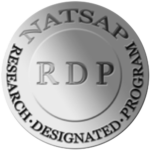Why do we conduct research?
 Each family at True North has a unique story with their own specific struggles and goals. It is our aim to provide individuals and families the best care and support possible as we collaborate to chart the course toward a successful future. Wilderness therapy has a powerful way of identifying the difficulties families are facing and addressing them in a way that is specifically tailored to each family’s needs. Because True North values assessment as a foundational cornerstone of treatment, we integrate a variety of individualized evaluation processes to observe and gather information throughout each student’s stay. Asking students and parents to periodically answer questionnaires about family functioning and behavior is just one of the ways we collect information that can help inform the course of treatment and observe outcomes.
Each family at True North has a unique story with their own specific struggles and goals. It is our aim to provide individuals and families the best care and support possible as we collaborate to chart the course toward a successful future. Wilderness therapy has a powerful way of identifying the difficulties families are facing and addressing them in a way that is specifically tailored to each family’s needs. Because True North values assessment as a foundational cornerstone of treatment, we integrate a variety of individualized evaluation processes to observe and gather information throughout each student’s stay. Asking students and parents to periodically answer questionnaires about family functioning and behavior is just one of the ways we collect information that can help inform the course of treatment and observe outcomes.

Neil Binette and Bogie Foden presenting their research findings at a recent NATSAP event
 This careful focus on assessment for treatment purposes also applies to our internal efforts to continually develop and improve our program across all departments while contributing to a large body of data in the field of wilderness therapy. As a Research Designated Program and member of NATSAP (National Association of Therapeutic Schools and Programs), we have been contributing to evidence based research studies for several years now. Click here for more information about the NATSAP Research.
This careful focus on assessment for treatment purposes also applies to our internal efforts to continually develop and improve our program across all departments while contributing to a large body of data in the field of wilderness therapy. As a Research Designated Program and member of NATSAP (National Association of Therapeutic Schools and Programs), we have been contributing to evidence based research studies for several years now. Click here for more information about the NATSAP Research.
 True North is also a member program of the Outdoor Behavioral Healthcare Council which has been instrumental in facilitating research to study the efficacy of the the wilderness therapy treatment modality and sets a high standard that families can trust when seeking a solution for their struggling adolescent or young adult. It is our hope that as studies continue to emerge, wilderness therapy will become more accessible to families through increased insurance reimbursement opportunities and a greater awareness in the mental health field of the effectiveness of this type of treatment. Click here for more information about OBH.
True North is also a member program of the Outdoor Behavioral Healthcare Council which has been instrumental in facilitating research to study the efficacy of the the wilderness therapy treatment modality and sets a high standard that families can trust when seeking a solution for their struggling adolescent or young adult. It is our hope that as studies continue to emerge, wilderness therapy will become more accessible to families through increased insurance reimbursement opportunities and a greater awareness in the mental health field of the effectiveness of this type of treatment. Click here for more information about OBH.
How is the research conducted?
 True North is committed to the research process and in order to ensure consistency of data collection, the administration of the surveys is supervised by Alison McHugh, our Research and Alumni Coordinator. After enrolling at True North, students and their parents are invited to participate in research by answering questions about family and behavioral functioning, interpersonal relationships, and intrapersonal distress. The questionnaires are designed to help track treatment progress and are administered at intake, discharge, 6-months and 1-year post discharge. The surveys also provide an additional opportunity for clients to reflect on and identify areas of struggle and growth throughout the arch of treatment.
True North is committed to the research process and in order to ensure consistency of data collection, the administration of the surveys is supervised by Alison McHugh, our Research and Alumni Coordinator. After enrolling at True North, students and their parents are invited to participate in research by answering questions about family and behavioral functioning, interpersonal relationships, and intrapersonal distress. The questionnaires are designed to help track treatment progress and are administered at intake, discharge, 6-months and 1-year post discharge. The surveys also provide an additional opportunity for clients to reflect on and identify areas of struggle and growth throughout the arch of treatment.
Alison works with the clinical team and transition staff to keep clients and their families informed and to provide adequate windows of time to for survey completion within the therapeutic framework of the program. Parents can expect to receive e-mail notifications when surveys are active and reminders as necessary. Alison is careful to stay in touch with families and provide assistance during and after treatment. It is important to note that although conducting research is a priority for True North as a program, each family’s participation in the research is voluntary and a client’s decision to decline participation does not affect the scope or quality of treatment. Our top priority is to provide the best treatment and service possible to our clients and we will continue to engage in efforts to understand the impact our program is having on the families we work with.

Alison McHugh, Research and Alumni Coordinator


